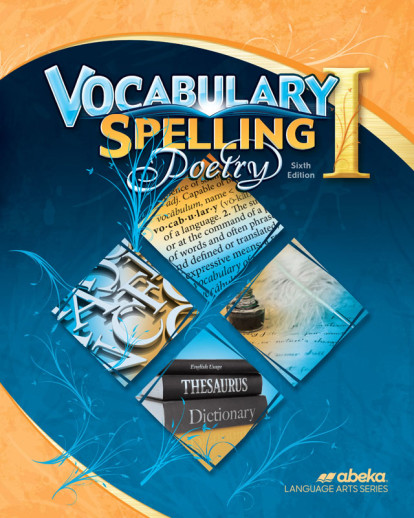We use cookies to make your experience better. To comply with the new e-Privacy directive, we need to ask for your consent to set the cookies. Learn more.
Vocabulary, Spelling, Poetry I Student Book
While your child works hard at mastering the words and definitions from his spelling lists each week, this book helps reinforce the correct usage of those words. With twenty-eight weekly quizzes and four quarterly review quizzes, your child's spelling and vocabulary skills will be evaluated and strengthened. Some of the exercises include applying spelling rules, using words in correct context, recognizing synonyms, and underlining misspelled words. You will also find eight well-known poems for recitation and memorization to enhance your child's appreciation of poetry.
A component of the Abeka English program, you could use this convenient vocabulary with spelling program on its own. A schedule, including spelling and vocabulary (as well as poetry memorization), is in the main English/Language Arts Curriculum Lesson Plans for each grade level. The student book has seven lessons per quarter in spelling and vocabulary. Spelling lists feature 20 words each and vocabulary has 10 words each. At this level, the focus is more on vocabulary with definitions, synonyms, antonyms, and fill-in-the-blank exercises. Spelling lists include commonly misspelled words and serve mostly as review. The poems are part of the Abeka English program and are placed in this series for convenience. Each level has between 8 and 10 poems of varying lengths. You could use just the student book and teacher key, or add the quiz book & quiz key if you like. Overall, the lessons are short and to the point and won't take loads of time for your busy student to complete. The words selected are challenging and often promote a Christian theme. Grades 1-3 have spelling and poetry. Grades 4-12 have spelling, vocabulary & poetry. Spelling Charts show the word lists from all 30 lessons. They are large format and two-sided. More details about each level are found on the website.
Add as a component of the Abeka English program or use this convenient vocabulary with spelling program on its own for an older student. A schedule including spelling and vocabulary (as well as poetry) is in the main teacher guide. The student book has 7 lessons per quarter in spelling and vocabulary. Spelling lists have 20 words each and vocabulary has 10 words each. At this level, the focus is on vocabulary with definitions, synonyms, antonyms, and fill-in-the blank exercises. Spelling lists focus on commonly misspelled words and serve mostly as review. The poems are part of the Abeka English program and are placed in this series for convenience. Each level has between 8 and 10 poems of varying lengths. You could use just the student book and teacher key or add the quiz book & quiz key if you like. Overall, the lessons are short and to the point and won't take loads of time for your busy student to complete. The words selected are challenging and used in a Christian context.
Spelling, Vocab & Poetry I emphasizes the application of spelling rules to lists of challenging words and the utilization of an expanded vocabulary. All the spelling words are practical, and many are words that are frequently misspelled. The goal of poetry recitation and memorization is to help students learn how to enjoy and appreciate poetic excellence.
| Product Format: | Paperback |
|---|---|
| Brand: | A Beka Book |
| Grade: | 7 |
| Length in Inches: | 10 |
| Width in Inches: | 8 |
| Height in Inches: | 0.1875 |
| Weight in Pounds: | 0.45 |

